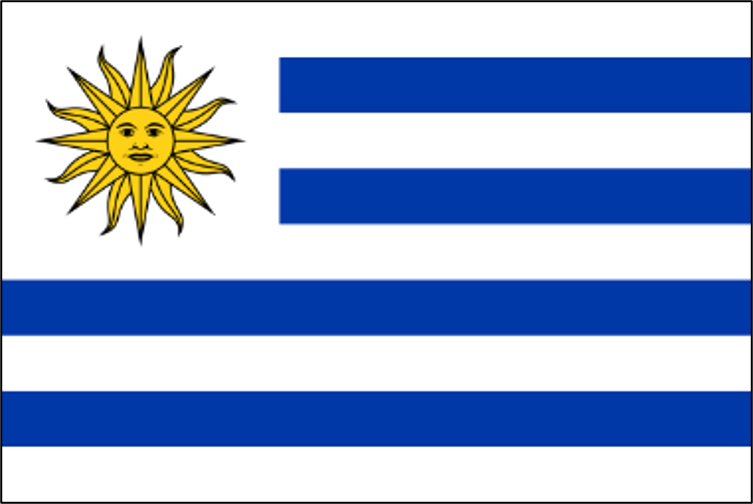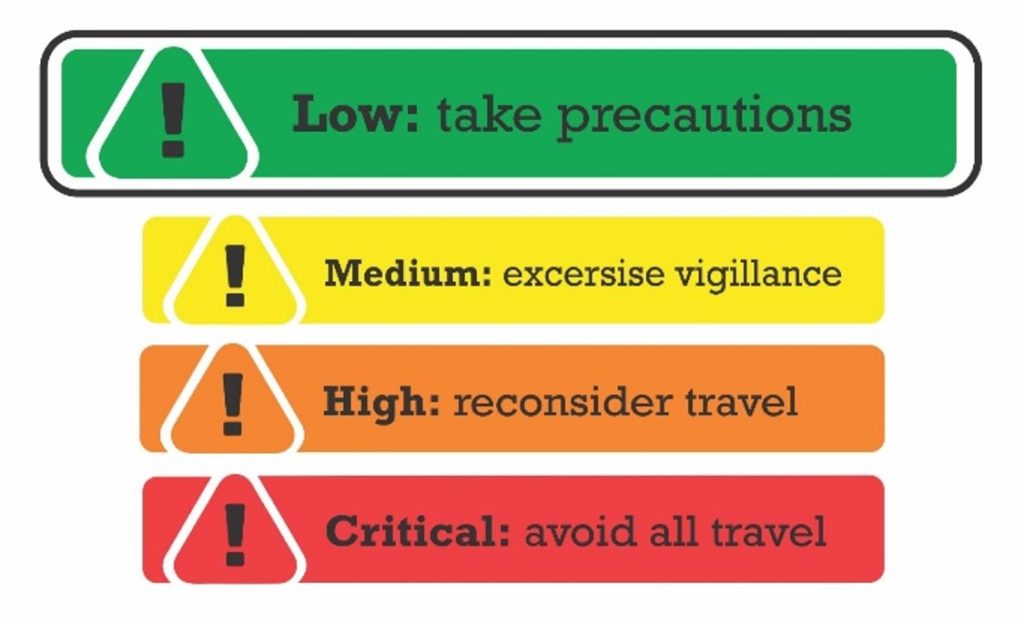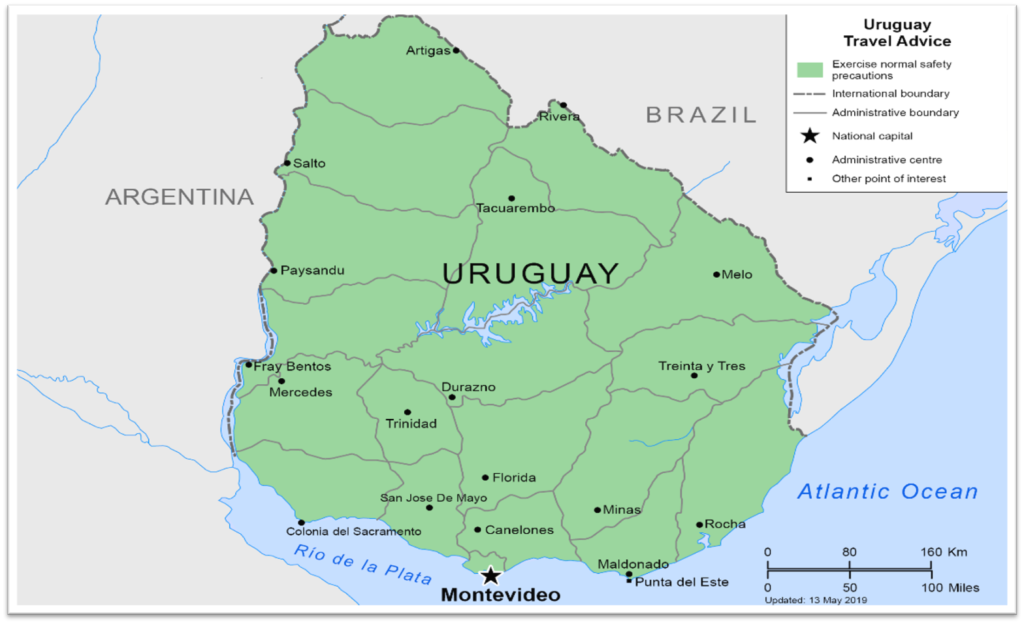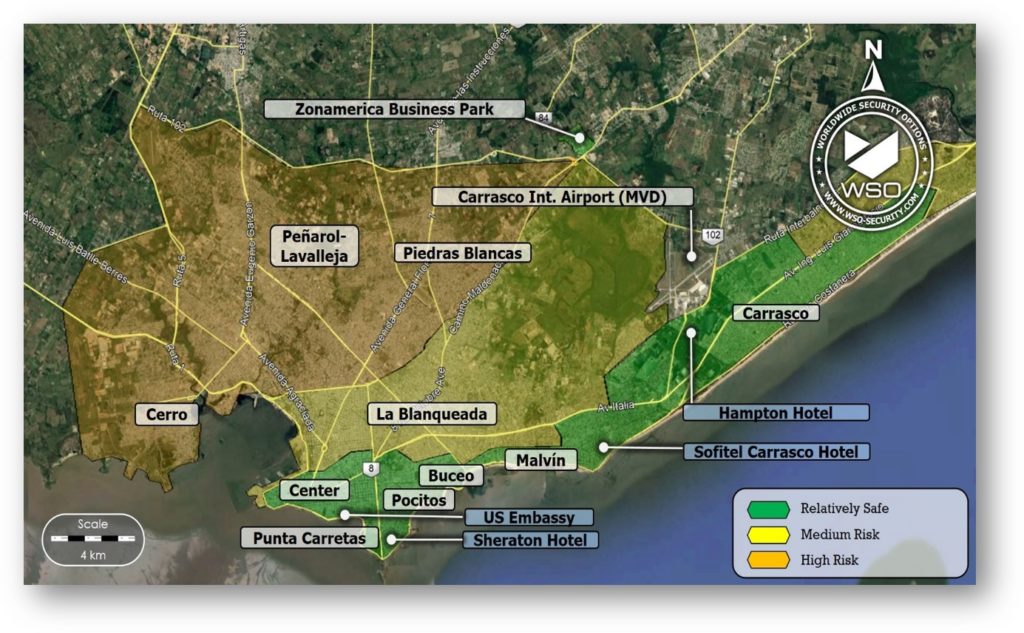| Official Name: | Oriental Republic of Uruguay |
| Official Language: | Spanish |
| Area: | 176,215 km2 (68,037 sq mi) |
| Population: | 3,449,285 |
| Time Zone: | UTC−3 |
| Capital City | Montevideo |
| Height (Montevideo): | 43 m (141 ft) |
| Currency: | Peso (UYU) |
| Main Cities: | Montevideo, Colonia, Maldonado |
| Main Port: | Montevideo Port |
| Required visa for entry: | Nationals from Canada, EU countries, the UK, and others DO NOT require visas. Click here for more information concerning visa requirements. |
| Required vaccination for entry: | None |

Main Risks:
Theft, robbery, rape, drug trafficking, fraud, carjacking.
Executive Summary
Uruguay features low risks. Low-level crime is the main threat to locals and foreigners, who are liable to suffer theft or become victims of fraud. We recommend exercising vigilance and situational awareness as basic precautions to mitigate the risk posed by crime. Risk levels increase considerably in Montevideo’s peripheric neighborhoods and could likewise increase along the border with Brazil, where drug trafficking elements are known to operate. Visits to Montevideo or to the tourist beach areas do not require executive protection services. However, we do recommend to procure secure transportation services for business or high-profile trips.

General Risk Level: LOW.
The risk remains stable throughout the country. It is not necessary totake or anticipate increased security precautions before traveling to Uruguay.

Crime and Security
Low-level crime is the main threat to those visiting Uruguay. The risk of suffering acts of violence is higher in Montevideo’s peripheric neighborhoods and in the bordering areas with Brazil. Criminals often operate in motorbikes to assault their victims. Although the main areas in Montevideo and the beachside sites along the Atlantic coast are safe, no area is completely spared from criminal activity.
Political rallies and demonstrations in Uruguay are not recurrent. Unlike other countries in the region, in most cases protests do not devolve into violence. Nonetheless, there is occasional hooligan violence surrounding soccer (football).
Political risk in Uruguay is minimum. It is widely regarded as one of South America’s most stable countries.
Security in Montevideo
In general, the safest areas are located in central and southern parts of the city, especially in the vicinity of the River Plate (Rio de la Plata). Zones recommended for lodging, travel, and conducting business and transactions are Punta Carretas, Trouville, Pocitos, Carrasco, Centro, and Buceo (Central Business District -CBD). These neighborhoods are perceivably safer because they feature prominent hotels and embassies. Moreover, these areas envelop Uruguay’s medium and high classes. That said, even in these areas it is still necessary to take basic precautions to mitigate the risk posed by crime. The Carrasco International Airport (MVD) is located to the east. The trip between the airport and the CBD in Buceo should take approximately between 30 and 45 minutes depending on traffic.

Transportation
For security reasons, we advise against using urban public transportation. For business or high-profile trips, we recommend procuring private transportation services. Four tourist trips it is possible to use ride-sharing apps. It is also feasible to use private taxis recommended by reputable hotels. Please note that taxi drivers may take advantage of foreigners to prolong the duration of trips and inflate fares. Four tourist-related trips to beachside areas along the Atlantic coast it is possible to take short and medium distance buses departing from the Tres Cruces terminal in Montevideo. Nonetheless, it is always preferable to rent a vehicle or to resort to private transportation services, especially if business itineraries are involved.
Health and Sanitary Conditions
There are no specific conditions in Uruguay that could present health risks to travelers visiting the country. The quality of tap water is very good and all of the main areas are well supplied.
As a precaution, it is not advised to travel without international health insurance covering emergency medical evacuation to the country of origin.
Take essential health precautions to mitigate the risk of contracting diseases or viruses. Carry masks in crowded places such as airports and maintain rules of social distance and avoid contact with surfaces of common use in public places. Always carry hand sanitizer.
Tactical Recommendations
Take basic precautions to mitigate the risk posed by low-level crime. While some neighborhoods are safer than others, all urban areas remain vulnerable to criminal episodes.
In Montevideo refrain from venturing beyond the safest neighborhoods, located in the vicinity of the coast. Stay at a reputable hotel located within one of these areas.
If the trip involves business or high-profile itineraries, we recommend procuring private transportation services.
Avoid carrying large sums of cash or valuables during the trip. We advise against wearing or carrying items in public that may give the impression of economic affluence and which could attract unwanted attention from criminals.
Do not resist armed robbery attempts. We recommend to always carry a few thousand pesos bills (UYU) or a few hundred USD bills for duress cases, specifically to appease criminals looking for easy money. If possible, procure international medical insurance covering emergency evacuation to the country of origin.
Emergency Contacts
Police: 109
Ambulance: 105
Fire: 104
WSO Global Command Center: +1 956 467 4858 / gcc@wso-security.com
Canales de WhatsApp para asesoría o asistencia en seguridad: +593 99 461 1128 / +521 81 1511 3166



